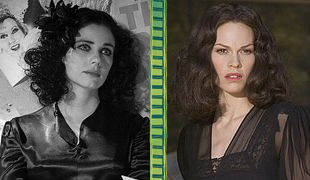film | Crimebotchers

Just to clear up any confusion, Brian De Palma's THE BLACK DAHLIA is not culled completely from factual events, but rather the James Ellroy novel that fictionally cracked the titular 1947 unsolved murder case. The acclaimed author has said that his book's speculative pulp functions as a pseudo-dedication to his mother, whose own unsolved murder 11 years later has held his imagination hostage since. That's a haunting story, and one that's far more compelling than the retro generics of De Palma's film, a visually sumptuous but dramatically ridiculous riff on hard-boiled noir classics and, of course, De Palma's favorite sequences from other movies he directed (Scarface, The Untouchables, Carlito's Way). In other words, The Black Dahlia is quintessential De Palma, only bad. Really bad. We're talkin' worse-than-Mission-to-Mars bad here.
The facts: The body of starlet-wannabe Elizabeth Short (Not Another Teen Movie's Mia Kirshner), 22, is discovered in a field in Los Angeles, bisected at the waist and mutilated further. The make-believe: As buddy cops Aaron Eckhart (Thank You for Smoking) and Josh Hartnett (Pearl Harbor) hunt for the killer, Eckhart downward-spirals into obsession, and Hartnett does a smoldering-look exchange with his pal's girlfriend (Scarlet Johansson in a self-consciously vampy performance that relies far too heavily on a prop cigarette holder). The investigation, which takes a backseat to the tepid romantic triangle — Eckhart's a rakish fit for Dahlia's rat-a-tat theatrics, but Hartnett and Johansson give the impression they're horsing around in gangster-flick dress-up — and boilerplate civic corruption, later ensnares a bisexual socialite played with a Bugs-Bunny-goes-to-the-ginjoint moxie by Hilary Swank; maybe this character wandered into the film by taking a right at The Hudsucker Proxy and a left at Bullets Over Broadway, because she definitely belongs to a different movie universe than the rest of the cast. Swank figures into one of Dahlia's bungled plot points: that she's the spitting image of the deceased, who's glimpsed alive but thoroughly sad in a series of seedy black-and-white audition clips. Yeah, um ...

Maybe nobody on the crew noted that Kirshner's period-perfect glamour doesn't nearly match Swank's vogue iciness because they were too busy tending to the hundred different directions the story goes in, forgetting about short — hello, the movie's called The Black Dahlia! — for chunks at a time. De Palma attempts to tie it all together with a final act that delves into high camp, replete with unlikely coincidences, silly deductions, and the screechiest villain confession ever, and why not? He's hit every other note. He even stages one of those sex scenes where Hartnett passionately clears the table of dinner, dishes, linens and centerpieces to make room for him and Johansson to get it on. If the next shot was of Johansson on her knees and picking bits of roasted quail and morteau sausage out of the designer carpet, I might give The Black Dahlia a little more credit. But it wasn't, so i don't have to. D




0 Comments:
Post a Comment
<< Home